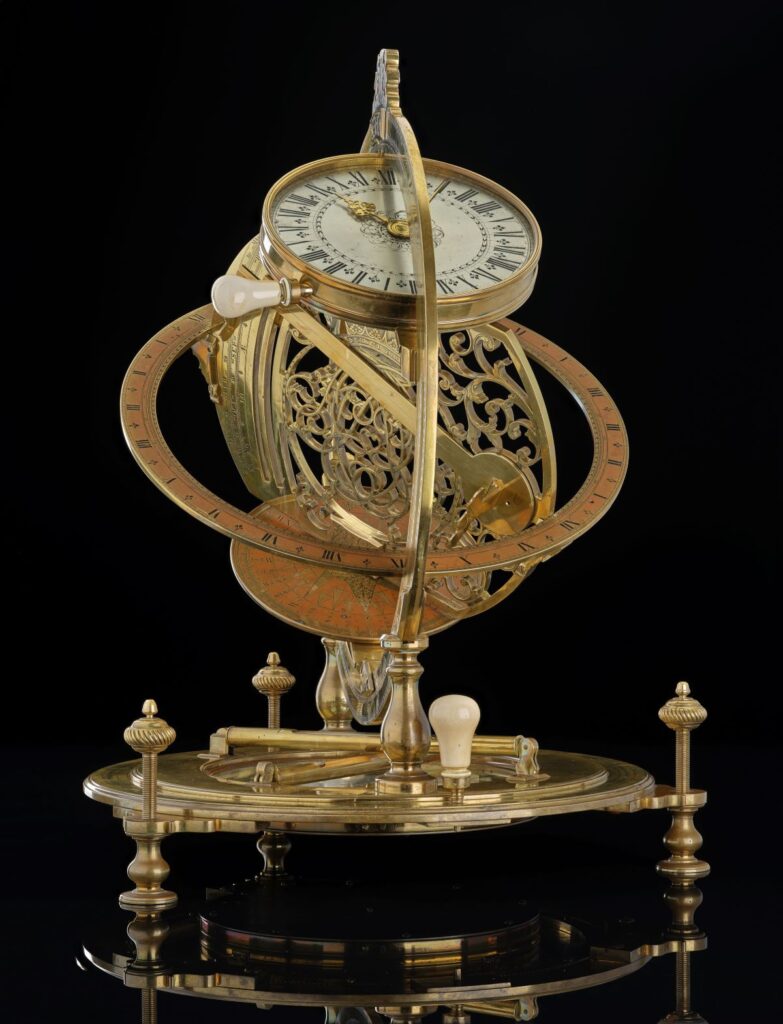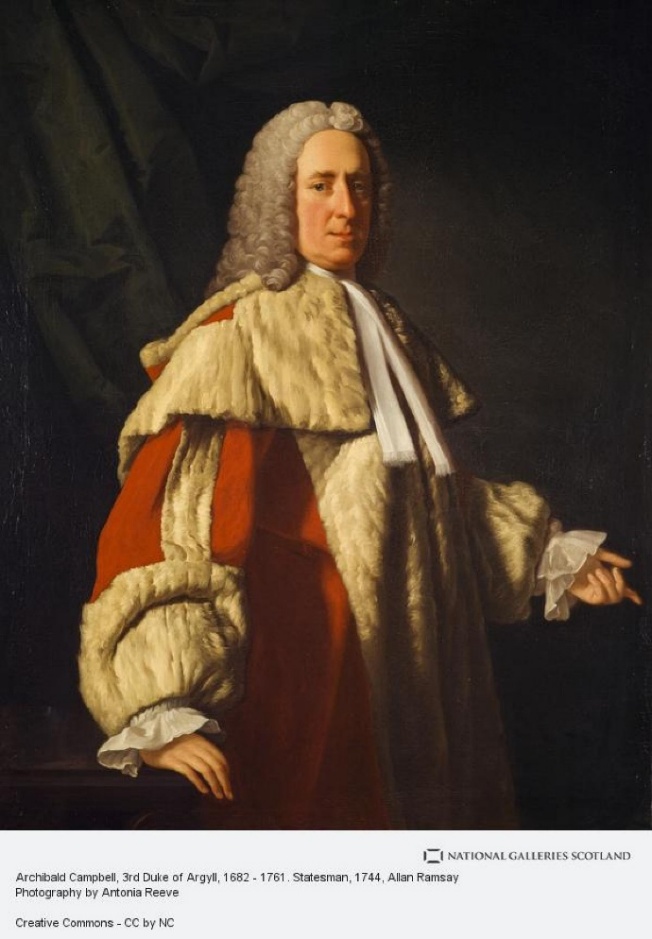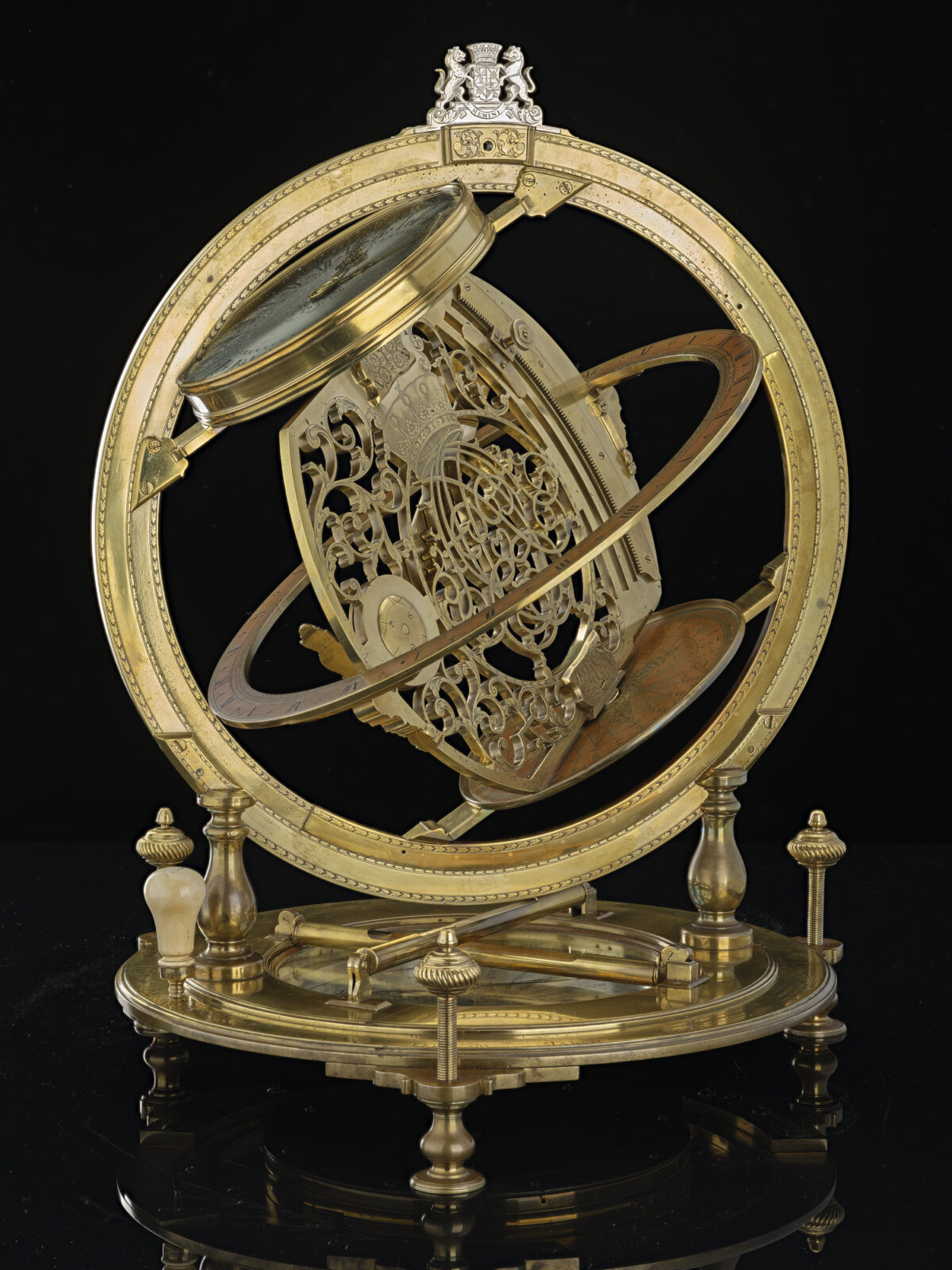16 January 2025, 7.30 pm at the Holy Trinity Church – Rebekah Higgit, Principal Curator of Science, National Museums Scotland.

This beautiful object acquired in 2023 by the National Museum of Scotland is the equinoctial sundial made by Richard Glynne in the early 18th century for Archibald Campbell, Earl of Ilay (later 3rd Duke of Argyll). The approximate size is 3 ft tall by 2 ft in diameter – a substantial hunk of artistically and skilfully designed brass. The dial is a complex scientific instrument, table-top rather than portable as you might expect, and designed to set time accurately according to the position of the sun in the sky. Spirit levels and adjustable feet ensure it can be precisely levelled; finely divided graduations on the vertical ring allow the instrument to be adjusted for latitude; accurate north/south alignment is assured by a compass set in the centre of the base. The fenestrated central plate is rotated to line up with the sun. The time of day is read from a 24-hour scale on the inner ring, or from the hour dial on the top. The instrument also incorporates an adjustment for the time of year. In all, a complex, time consuming and expensive way to set one’s long case clock!
Glynne was a member of the Worshipful Company of Clockmakers in London and had set up as a maker of quality mathematical instruments of all sorts. Initially he set up business with his mother-in-law, Anne Lea, at the ‘Atlas and Hercules’ in Cheapside, before moving to premises in nearby Fleet Street in 1718. He was a highly reputable instrument maker, noted for the quality and accuracy of his workmanship. He was in at the beginning of the flowering of instrument making in London which, in the 18th and 19th centuries, was a renowned world centre of instrument manufacture and mapmaking: globes, armillary spheres, orreries, sundials, surveying instruments, navigation equipment, ordinance instruments for the military and, of course, maps. Many had distinct practical applications while others were used by gentlemen of means interested in the study of ‘experimental philosophy’, or scientific investigations as we would know them today. The equinoctial ring dial was made for one such gentleman, the Earl of Ilay, around 1720. It carries the Earl’s coat of arms, his initials, and the engraved signature of Richard Glynne.

Archibald Campbell, Earl of Ilay, later 3rd Duke of Argyll (1682-1761), was a powerful and influential presence in post Act of Union Scotland. He was one of the commissioners involved in negotiating the Act. An astute politician, lawyer, businessman and soldier Ilay was a Whig and loyal Hanoverian. Walpole granted him control of royal and personal patronage in Scotland where he became a powerful political presence. A member of the Privy Council he was appointed Keeper of the Privy Seal of Scotland and later Keeper of the Great Seal of Scotland. He was a founder member and first Governor of the Royal Bank of Scotland, and a founder and Governor of the British Linen Company. His portrait adorned certain RBS banknotes until early this century.
In the atmosphere of the developing Scottish Enlightenment, somehow Ilay found the time to pursue his interests in mathematics, mechanics and agricultural improvements. He was an early promotor of the still relatively new Newtonian principles of mechanics and took great interest in the development of scientific instruments of all kinds, in particular those which dealt with the motions of celestial objects, for example the sundial, orrery, armillary sphere, telescope and the like. He amassed a large collection of these instruments and maintained very substantial collections of the latest books on these, mathematics and his other practical interests. A very practical man in many ways, Ilay was able not only to use the instruments but also often took them apart and rebuilt them, no doubt to deepen his understanding of their functions.
In addition to his support for renowned instrument makers, he also offered his patronage to engineers, mathematicians and map makers. For example, he invited John Desaguliers – a Huguenot émigré, engineer, innovator, natural philosopher and clergyman – to Edinburgh to suggest improvements to the city’s water supply. Desaguliers was an assistant to Isaac Newton and did much to extend the mathematics of The Principia to practical applications. He and Ilay therefore were very much in harmony; indeed, Ilay became godfather to Desaguliers’ son. Of further note was his sponsorship of the young Scottish mathematical prodigy Colin MacLaurin: Ilay and Isaac Newton leant their weight to his application to the University of Edinburgh, where he became the youngest Chair of Mathematics the university has had, at the age of 27.
Ilay was a great enthusiast for agricultural improvements then on-going in Scotland. His practical bent saw to the planting of many trees on his extensive lands, the development of arboretums and the laying out of parkland and gardens. His English properties included Argyll House (no longer standing) in London’s Oxford Street, and a substantial estate at Whitton Park on the edge of Hownslow Heath. Here Ilay was renowned for his development of extensive landscape gardens and other plantings on what had been rough scrubland. The Whim estate in the Scottish Borders offered a greater challenge: Ilay converted a bog into a substantial garden and woodland. The principal residence of the Duke of Argyll in Scotland is Inverary Castle, which Ilay inherited with the Dukedom on the death of his brother and he immediately instituted work to improve and extend the building to the form we see today.
So, there we have him: Earl of Ilay politician, lawyer, businessman, soldier and, through his patronage and personal interests, an influential driving force behind the Scottish Enlightenment.
Peter R

You must be logged in to post a comment.